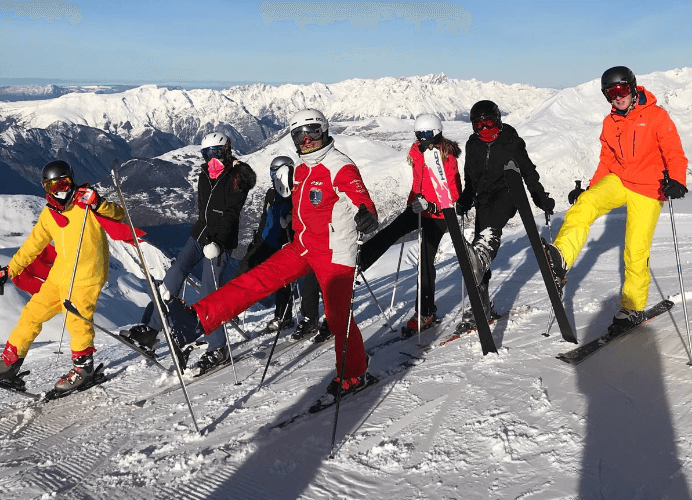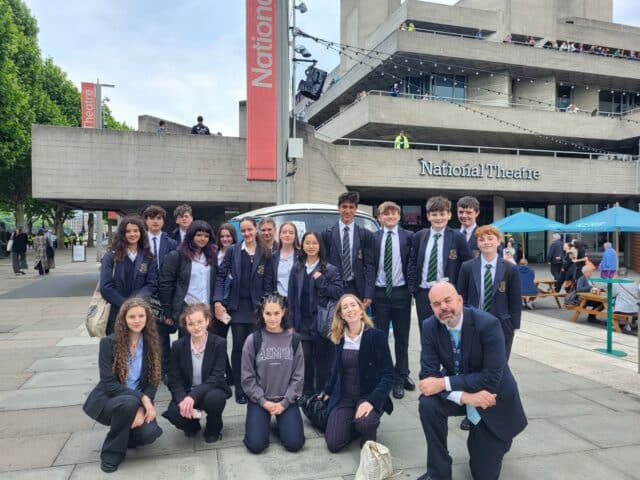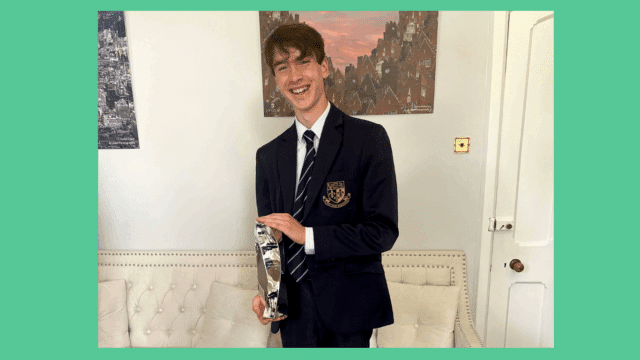During the Christmas holidays, 32 Epsom pupils travelled to the French Alps to take part in the annual Junior ski trip. The pupils were excited to get to the slopes after a demanding Michaelmas term.
During the week, the group skied the entire mountain with stunning views of the glacier and the surrounding peaks. They were spoiled by fantastic conditions with plenty of fresh snow to enjoy. The weather was generally kind and they enjoyed a few days of sunshine.
The ski instructors commented on the very high standard of the Epsom skiers and said how much fun they had guiding the pupils around the mountain. The ski groups made excellent progress and most left better skiers than they arrived. They were true ambassadors of the College.
On the final night, awards were presented to students who best demonstrated the qualities the trip sought to develop. These were as follows:
Most accomplished skier – Seamus Macleod (H)
Most stylish and graceful skier – Jemma Mapp (R)
Most improved girl – Amy Scerri (M)
Most improved boy – Will Springett (Fa)
Wildest child of the mountains – Leo Hales (F)
Community award (most helpful and best team player) -Will Raymond (P)
Diplomacy award (top Epsom and UK ambassador) – Lewis Price (F)
Reflections from the Bottom of the Slope, by Nick Russell
And the end of all of our exploring
Will be to arrive where we started
And know the place for the first time.
T.S. Eliot
Sometimes you just find yourself going somewhere and you’re not entirely sure how or why. This is what happened to me. At some point in the long gorgeous summer I apparently had a conversation with Rob Johnstone and agreed to join the ski trip. I soon forgot about it.
As the Michaelmas term progressed, what had seemed a distant concept began to harden at the edges and take on the disturbing features of a future reality. An itinerary appeared in my pigeon-hole. It was going to happen. Still, as the all-absorbing busyness of term maintained its relentless rhythm, it remained possible, indeed practicable, to repress this future reality and focus instead on the pressing needs and pleasures of the present: reports, essays, parents’ evenings, lessons, meetings, assemblies, plays, dinners and extravaganzas. But when the alarm bleeped at 4.15am on the morning after the end of term, the bald hard fact had to be faced: I was heading to Les Deux Alps with 32 students – having never set foot in skis before in my life.
Mad as it may sound, there is something of the Wild West about Les Deux Alps. Perched between two mountains, almost beyond the reach of civilisation, it is a place where nature rules with its mighty cold fist. In Epsom we gear up the gritters at the merest suggestion of frost, but at Les Deux Alps the authorities have sort of given up the battle: the roads and pavements are permanently encrusted with ice and snow. The sense of the Wild West is furthered by the wooden houses, the open fires and the pervasive sense of danger: the threat does not come not from stray bullets or godless outlaws but from stray snowballs and from every slippery step that is taken on this treacherous ice rink.
And nowhere is the spirit of the Wild West more alive than on the mountain itself. It is a lawless space where thousands of skiers and snowboarders are constantly descending the mountain like a wild guerrilla army in fancy dress. Skeletons, Father Christmases, penguins, dinosaurs, and some maniacs with no clothes on at all, all rush and criss-cross past the beleaguered newcomer.
I soon recognised that Les Deux Alps was no place for the old. This begged the question: what was I doing here?
But the scenery is breathtaking. Flooded with a brilliant sparkling sunlight, there is a crisp sharpness to everything in the landscape, especially the jagged edges of the mountain tops. The very air feels thin, refined and clean, and so as you breathe and look about it is impossible to feel anything other than thrillingly alive.
The whole trip was organised with unflappable efficiency by Rob Johnstone. Safety and security were always paramount but there was never a sense being stifled or overly controlled: all was held together with reins of an invisible silken leash. Food was locally sourced, plentiful and nutritious. With four expert instructors on hand, all tending to different ability levels, everything was set up to provide the students with the best possible skiing experience. The Advanced marauded over entire mountain, learning tricks and tips along the way, while the beginners went from learning how to put on skis on day one to slaloming at speed on the final day.
Reflections on Teaching and Learning.
One of the main benefits of the trip for me was to experience a total reversal of the teacher dynamic. Instead of being an Assistant Head I was an absolute beginner, a total novice, and I relearned just what that feels like and what is needed to help you advance. It brutally retaught me lessons I already knew. I have listed these below.
Listen to advice and never be late
If you don’t listen to instructions you’re sunk. The routine for the sessions always followed the same pattern: explanation/demonstration of a skill from the instructor (ours was a rather impatient taskmaster called Sophie) followed by each student in turn giving it a go.
I was late to the first session (not actually my fault, I had twice fallen off the drag wire – a thing that moves with deceptive swiftness) and so missed out on the explanation. Consequently, when demonstrating my ‘skill’ I wound up in a tangled heap some 40 yards away from the group. This made me late to the next lesson and so I again missed the explanation/demonstration and once again crashed far away.
Rinse and repeat throughout the day and you have an accurate understanding of my learning experience of day one.
Practise, practise, practise
The act of learning is a deeply mysterious invisible process. Ultimately the aim is to embed knowledge/habits into the unconscious mind so that you ‘just know’ without having to think too much about it.
There are two routes to the promised land of ‘just knowing’. The first is using the battering ram of the conscious mind – taking in advice and relentlessly seeking to apply it. As explained, I missed a lot of advice/explanation and so this method’s effectiveness was limited for me. But there is a second way of learning and that is just to keep on practising and allow the unconscious mind to learn by itself – which, remarkably, it does. I learned to ski (sort of) without really knowing what I was trying to do.
Fail well. Ignore the crowd. Always focus on the task in hand
I was with the beginners. But confidence evaporates very quickly when you realise that you are at the bottom of the beginners’ class.
As a consequence, being asked to demonstrate one’s incompetence publicly is both stressful and embarrassing. Knowing before you begin that you’re going to fail in front of everyone can be demoralising. There is a temptation to think more about the inevitable sniggers than the task itself.
Nevertheless throwing yourself wholeheartedly into each task is the only way to progress and this is what I did. Many thanks to all the beginner students for being nothing other than supportive throughout.
Teachers’ Manners Matter
The instructors soon acquired a godlike status for me – a sense that was deepened whenever I fell and they reached out of the sky to pull me up. I clung to every word they said, though, as explained, I missed many of their words as I was disentangling myself from a knot of skis.
Sophie soon lost patience with me. She would shake her head, prod me with her pole and criticise. I would hear her exasperated French as I veered off at speed in the wrong direction. My saviour was actually a trainee instructor called Alexson. His English was worse than my French (in learning how to stop he kept telling me to ‘open snow plough’ which I mistook – with disastrous results – to mean to open my diagonally closed skis) but as he was patient and supportive I improved under his guidance.
The whole experience reminded me that kindness and clarity are key qualities that will help a student improve.
Seek the right level of challenge
Learning occurs by attempting something new; ideally the ‘something new’ should be just outside one’s comfort zone, just beyond what is already mastered. This is the sweet spot where you have just about enough confidence in the already mastered skills to move into a new unknown.
Attempting something way beyond your capacities is pointless and dangerous. Which is why I’m still puzzled that Sophie thought it a good idea to send me down a Blue Run on the afternoon of day two (I think it may have been a way of venting her frustration with me). It was absolutely terrifying.
I suddenly found myself whistling down a mile long piste – with a cliff edge to my right – not really confident that I could either stop or turn. Somehow I made it to the end but with everything about me – both inside and out – quivering violently. I self-diagnosed myself as suffering from Alpine PTSD (a condition that is not conducive to learning).
Note to teacher self: always pitch the challenge appropriately and avoid giving students PTSD.





